 |







|
|
|
MILTON CANIFF - TERRY AND THE PIRATES
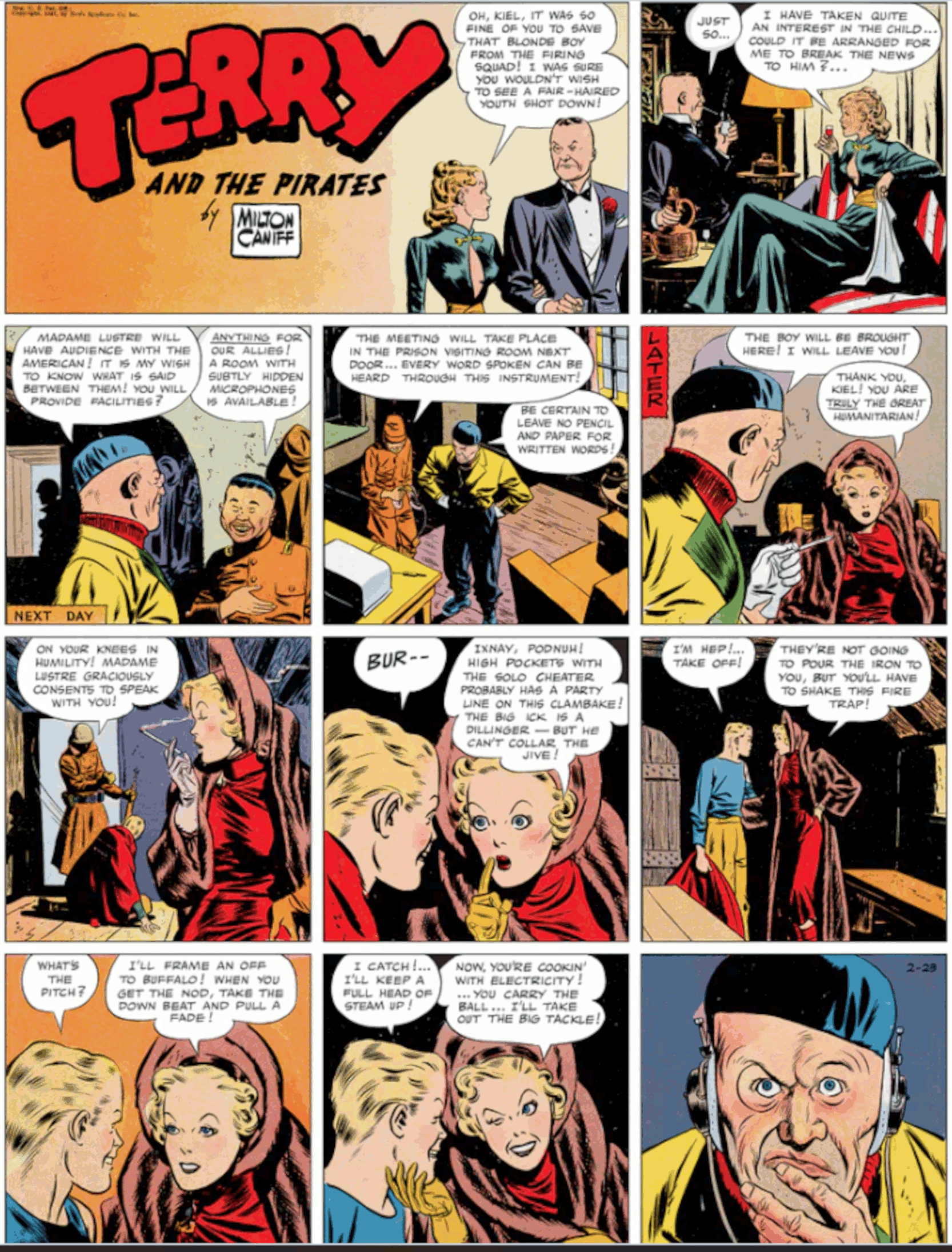
Terry and the
Pirates: The Master
Collection, vol. 7. |
- The strip, created by Milton Caniff, featured American characters fighting against villains in China and the Pacific theater during World War II.
- The comic strip began in 1934, when protagonists Terry Lee and Pat Ryan began their travels in China.
- Apparently Terry Lee was a 'wide awake American boy' whose
grandfather left him a map of a goldmine in China.
- Terry
was age 12 when he first arrived in the Orient.
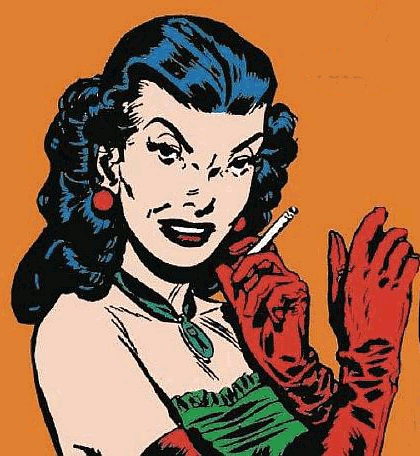
Dragon Lady |
- The story line included characters and events of the war in China with the two heroes working with the Chinese military to fight the Japanese forces.
- Caniff’s cartoon syndicate prohibited him from identifying the enemy as Japanese, so, in the comic strip, they were only referred to as
'the invaders.'
- During the 12 years that Caniff produced the strip, he introduced many fascinating characters, most of whom were
'pirates' of one kind or another.
- How very differant slang was during the 1930s and 1940s.
|
They were soon attacked by river pirates, led by the exotic Chinese “Dragon Lady.” She was the first of several gorgeous female characters who would appear in Caniff’s works. The erotic appeal of these cartoon women was a major reason the comic strip enjoyed a large, devoted following among American GIs.
(Jeff Nilsson)
|
|
Adventure Comics for Grown-Ups |
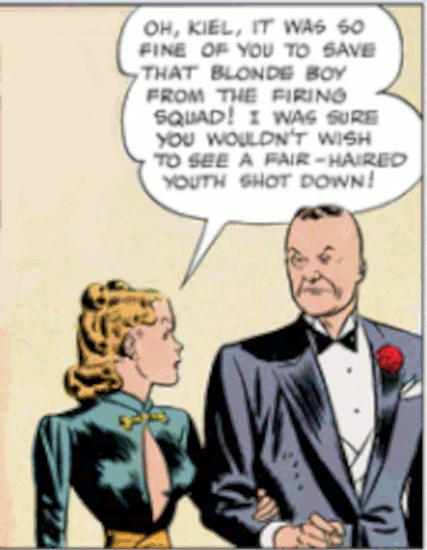
Frame 1 |
- The fair-haired youth was Terry Lee who was a teenager when the series begins, he is excitable and loves adventure.
- Terry looks about 15 years old in this strip.
- Beautiful Burma thanks Kiel, the haughty
German officer for saving Terry from a firing squad and she
knew the Nazi's like 'fair hair.'
-
Apparently Burma sings the blues, the 'St. Louis Blues' and
her blouse is very revealing.
- In mid-1941 when Kiel
was introduced to the series, he was sent to China to work with the Japanese on a special project.
|
By 1941, Adolf Hitler and the Nazi war machine were appearing with increasing frequency in American popular fiction as the Bad Guys. The stereotype of the haughty German officer (which first appeared in fiction during the First World War) was revived, as well as that of the unquestioning minions that served them. Which is what makes this sequence by Milton Caniff so interesting.
(the-unmutual.blogspot.com)
|
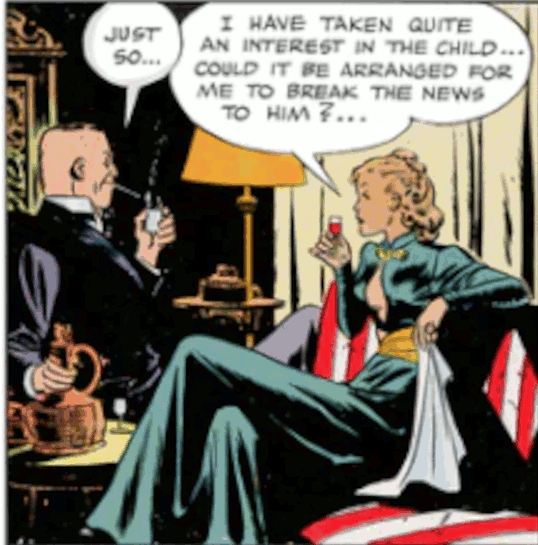
Frame 2 |
- The Nazi officer Kiel and Burma are chatting and she
wants to break the news to fair-haired Terry that he was
spared from a firing squad while living in China.
- A white handkerchief can symbolize surrender, truce, or peace,
however, historically, it has been used for romantic signaling.
- It looks like Chianti red wine.
|
Burma: Real name unknown, a con artist, former pirate confederate and sultry singer with a good heart. She encounters Terry and Pat several times. She and Terry share a casual romantic connection, but Burma is afraid of letting it become serious. She has a habit of singing "St. Louis Blues".
(Wikipedia)
|
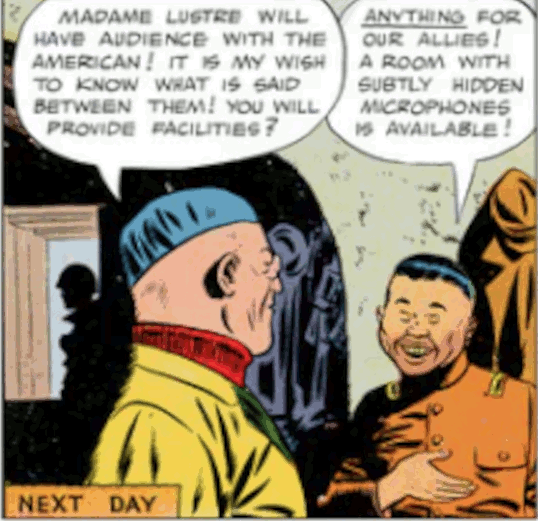
Frame 3 |
- Officer Kiel informs the Chinese officer about Madame
Lustre's meeting with Terry Lee that was to take place the
next day.
- The special room will be tapped and have
microphones hidden.
|
During World War II, Caniff, who had been dealing with the Japanese invaders since the late 1930s, turned Terry and the Pirates into a fairly authentic chronicle of combat activities in the China-Burma-India theater. He left his strip at the end of 1946 to do Steve Canyon. Terry and the Pirates, taken over by George Wunder, continued until early in 1973.
(encyclopedia.com)
|
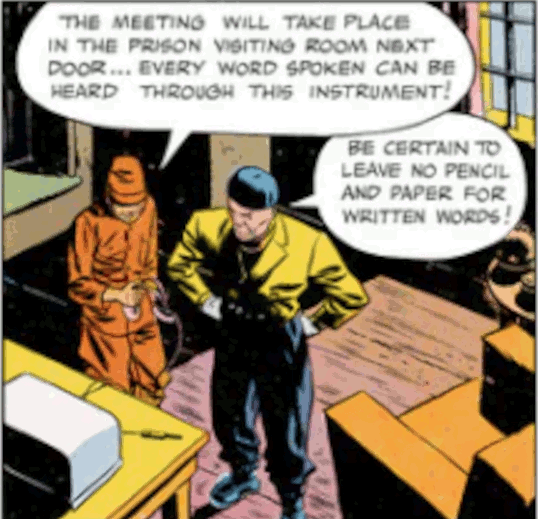
Frame 4 |
- The Chinese officer takes Kiel on a tour of the prison
visiting room.
- Hands in pockets could symbolize a Masonic
hidden hand.
- There s already an instrument installed
that will allow them to hear everything.
- Kiel warns him
not to leave any paper and pencils laying around for them to
exchange notes.
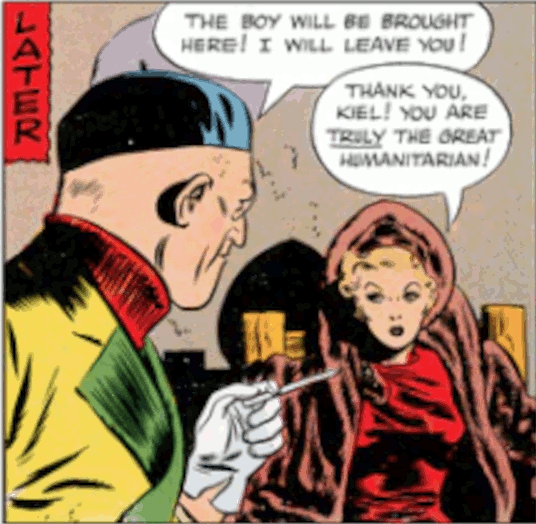
Frame 5 |
- Later that day, Nazi Officer Kiel informs Lustre that
Terry Lee will be delivered to the visiting room in the
prison.
- He pretends to leave but will be spying from the
next room.
- Lustre boosts his ego with false words by
calling him a humanitarian.
- Freemasons and Nazis wore a
lot of white gloves.
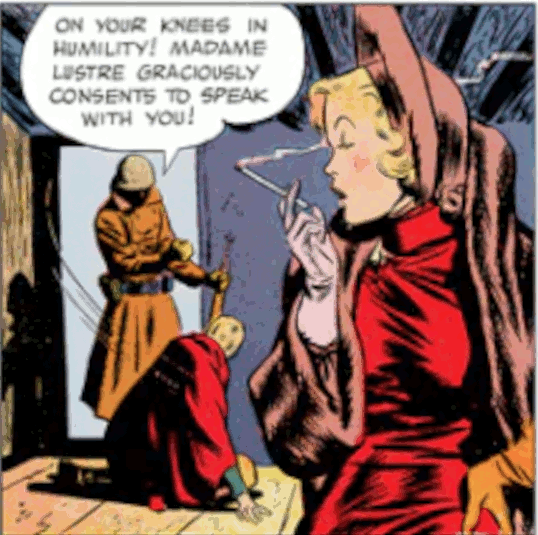
Frame 6 |
- Terry is brought into the visiting room.
- He's frightened and hunkered down as the Nazi
officer tells him Madame Lustre asked to speak to him and he
needs to stay on his knees.
- Madame Lustre
turned out to be beautiful Burma, the blonde bombshell
and good-time girl in disquise.
- Femme fatale with a cigarette holder.
- She was close to Nazi
Officer Kiel, however, he eventually loses Lustre when Terry
turns the tides on him.
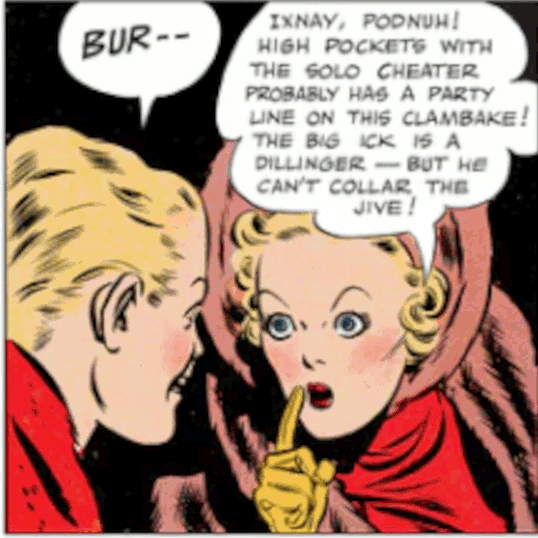
Frame 7 |
- Burma warns fair-haired Terry not to reveal the secret
of who she really is because the troops know her as Lustre.
- She
knows all the teenage jargon and slang; 'High Pockets with the
solo cheater probably has a party line on this clambake! The Big Ick is a
Dillinger, but he can't collar the jive.'
- 'Ixnay' is a slang term that means
'no' and is a playful form of the word 'nix' and 'podnuh' is a slang term for
'partner' or 'friend.'
- The 'big ick' is someone repulsive
and the Dillinger a gangster, outlaw, or public enemy.
- 'Can't collar the jive' means someone is
'not hip,' or simply, they don't understand what is being said.
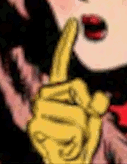
Secret |
- Terry is hushed up before he even got a word
in with what could also be a Masonic hand sign indicating
secrets.
- 'High Pockets' is an old-school (mocking) nickname
for certain devious tall guys (arrogance thinks very highly of
itself) and it's also the title of an old Western movie, making it a subtle dig at their
'Cowboy vs Indian' roles.
- The term can also refer to someone who has a high-ranking
position but is undeserving due to incompetence and ignorance.
|
In late summer of 1942, after the U.S. had formally been at war for several months, senior representatives of the Army, the Navy, and the Federal Bureau of Investigation (FBI), met with a representative of the Office of War Information (OWI), the U.S. World War II-era propaganda agency. They met to discuss the need for some sort of action to educate the public about the need for security for military information. The result was the establishment of the Security of War Information Campaign, sometimes referred to as the “hush-hush campaign,” and the Security Committee, which cleared all plans for that effort.
(the-unmutual.blogspot.com)
|
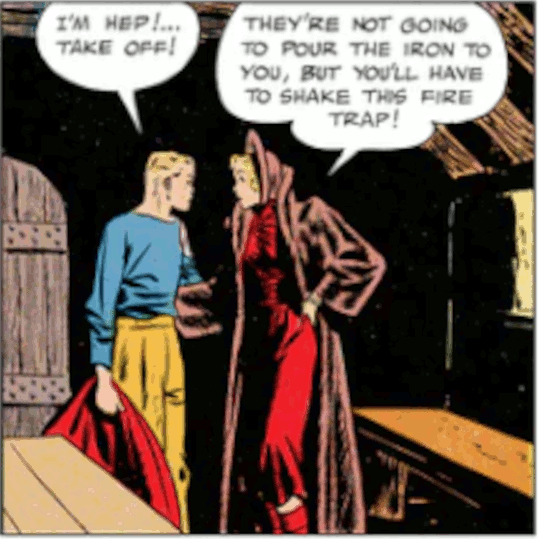
Frame 8 |
- Wow, Burma knows all the lingo and informs Terry he
escaped the iron from the firearm, but will still have to shake the fire trap,
or prison,
that he's in.
- Terry agrees of course, he's hep which was part of the
'jive' that was associated with jazz music and could also mean
to count steps while marching.
- He's hip/cool and leaving now.
- These can also be
sexual terms, for example, firetrap as an STD.
- Hands in
pockets could symbolize a Masonic hidden hand and her left leg
is partially exposed.
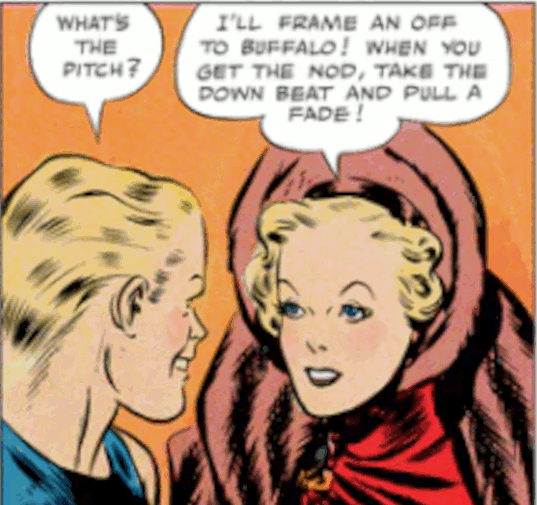
Frame 9 |
- Burma will frame the story with her version or take on it.
- Off to Buffalo was used often on the Simpson's too, however,
during Terry's time,
it was a popular saying that came from the 1933 musical
42nd Street.
- What's the pitch, or the angle, 33
degrees.
- Take the down beat, Terry is advised to leave quickly and quietly
but it is also a musical term as downbeat refers to the strong beat or the first beat of a rhythmic pattern in music.
- Like a drum.
- To pull a fade, can mean disappear, or it
can even mean to get into a physical altercation or fight.
|
"Shuffle off to Buffalo" is a phrase that has multiple meanings, but its most common use is as a euphemism for leaving to get married, which comes from a 1933 Broadway song. The phrase can also refer to a simple tap dance step, or more generally, "off to Buffalo" can mean a journey, sometimes to a less-than-ideal destination.
(Assistant)
|
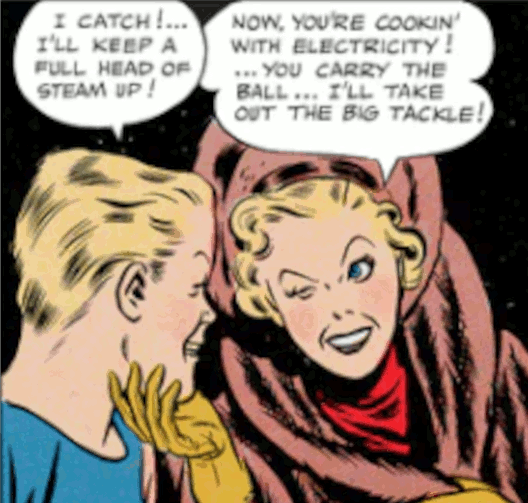
Frame 10 |
- You're cooking with electricity was a more modern
version of cooking with gas, meaning you're progressive or
doing something well.
- The 'Big Tackle' can refer to a man's genitals,
or it can be used as an adjective for size or importance.
-
Also, Burma shows what could be interpreted as a Masonic hand
signal signifying either a blessing, or a cult symbol of
putting your heart, or your entrails in the cupped hand as a
sacrifice.
- There could be a lot of sexual connotation
there with that wink, especially since there's the chin
squeeze, but then again, not everyone will see it that way.
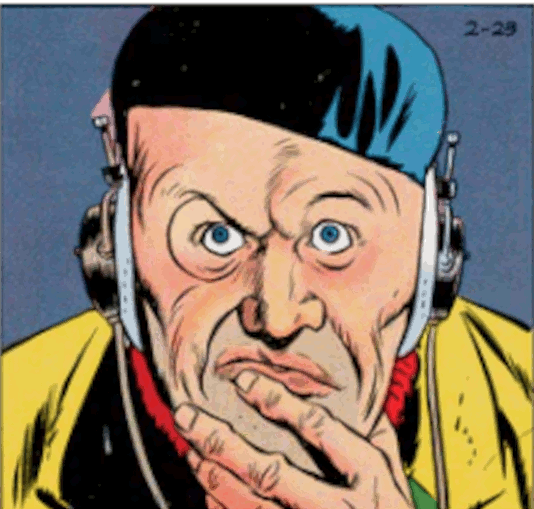
Frame 11 |
- Nazi Officer Kiel thinks about things and remember, he's
listening in to Burma and Terry.
- You have to wonder how
good Kiel was with American teen talk and slang?
- Obviously, the
12-year-old boys (and older) in the audience can also come to
their own conclusions.
|
Be careful. One false step will mean certain death!
The Dragon
Lady

| |
 |
 |